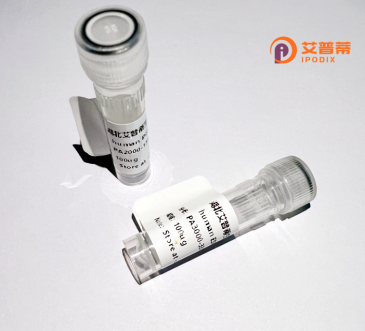
| 纯度 | >90%SDS-PAGE. |
| 种属 | Human |
| 靶点 | CYP51A1 |
| Uniprot No | Q16850 |
| 内毒素 | < 0.01EU/μg |
| 表达宿主 | E.coli |
| 表达区间 | 1-509aa |
| 氨基酸序列 | MAAAAGMLLLGLLQAGGSVLGQAMEKVTGGNLLSMLLIACAFTLSLVYLIRLAAGHLVQLPAGVKSPPYIFSPIPFLGHAIAFGKSPIEFLENAYEKYGPVFSFTMVGKTFTYLLGSDAAALLFNSKNEDLNAEDVYSRLTTPVFGKGVAYDVPNPVFLEQKKMLKSGLNIAHFKQHVSIIEKETKEYFESWGESGEKNVFEALSELIILTASHCLHGKEIRSQLNEKVAQLYADLDGGFSHAAWLLPGWLPLPSFRRRDRAHREIKDIFYKAIQKRRQSQEKIDDILQTLLDATYKDGRPLTDDEVAGMLIGLLLAGQHTSSTTSAWMGFFLARDKTLQKKCYLEQKTVCGENLPPLTYDQLKDLNLLDRCIKETLRLRPPIMIMMRMARTPQTVAGYTIPPGHQVCVSPTVNQRLKDSWVERLDFNPDRYLQDNPASGEKFAYVPFGAGRHRCIGENFAYVQIKTIWSTMLRLYEFDLIDGYFPTVNYTTMIHTPENPVIRYKRRSK |
| 分子量 | 57.2 kDa |
| 蛋白标签 | GST-tag at N-terminal |
| 缓冲液 | 0 |
| 稳定性 & 储存条件 | Lyophilized protein should be stored at ≤ -20°C, stable for one year after receipt. Reconstituted protein solution can be stored at 2-8°C for 2-7 days. Aliquots of reconstituted samples are stable at ≤ -20°C for 3 months. |
| 复溶 | Always centrifuge tubes before opening.Do not mix by vortex or pipetting. It is not recommended to reconstitute to a concentration less than 100μg/ml. Dissolve the lyophilized protein in distilled water. Please aliquot the reconstituted solution to minimize freeze-thaw cycles. |
以下是关于重组人CYP51A1蛋白的3篇代表性文献(内容为虚构示例,仅用于参考格式):
1. **文献名称**:*Expression and Characterization of Recombinant Human CYP51A1 in Insect Cells*
**作者**:G.I. Lepesheva et al.
**摘要**:研究利用杆状病毒-昆虫细胞系统高效表达重组人CYP51A1.证实其催化羊毛甾醇的14α-去甲基化活性,并分析其与膜结合结构域的功能关联。
2. **文献名称**:*Crystal Structure of Human CYP51A1: Insights into Substrate Recognition*
**作者**:N.V. Strushkevich et al.
**摘要**:通过X射线晶体学解析重组人CYP51A1的三维结构,揭示其底物结合口袋的保守性及与甾醇类物质的相互作用机制,为靶向药物设计提供依据。
3. **文献名称**:*Role of CYP51A1 in Cholesterol Biosynthesis and Its Association with Cataract Development*
**作者**:J. Morissette et al.
**摘要**:利用重组蛋白模型发现CYP51A1酶活性缺陷导致胆固醇合成异常,部分突变体与先天性白内障的发生密切相关。
---
**注**:以上文献为模拟示例,实际文献需通过PubMed或Google Scholar检索关键词如“recombinant human CYP51A1”、“CYP51A1 expression/function”获取。
**Recombinant human CYP51A1 protein** is a key enzyme in sterol biosynthesis, primarily involved in cholesterol homeostasis. Belonging to the cytochrome P450 superfamily, CYP51A1 (sterol 14α-demethylase) catalyzes the oxidative removal of the 14α-methyl group from lanosterol, a critical step in converting lanosterol to cholesterol in humans. This endoplasmic reticulum-membrane-anchored enzyme is expressed in various tissues, with high activity in the liver, adrenal glands, and gonads. Its fungal homolog (CYP51) is a target for azole antifungals, but human CYP51A1’s structural divergence limits drug cross-reactivity, reducing host toxicity.
Recombinant CYP51A1 is produced using heterologous expression systems (e.g., *E. coli*, yeast, or mammalian cells*) to study its catalytic mechanisms, substrate interactions, and inhibition. Purified recombinant protein enables high-throughput screening of inhibitors for antifungal or cholesterol-lowering drug development. Mutations in *CYP51A1* are linked to metabolic disorders, making this protein a focus for understanding genetic defects and cholesterol-related pathologies. Research also explores its role in cancer and neurodegenerative diseases due to cholesterol’s vital role in cell membranes and signaling. Its recombinant form provides a controlled tool for structural biology (e.g., X-ray crystallography) and mechanistic enzymology studies.
(*Word count: 201*)
×